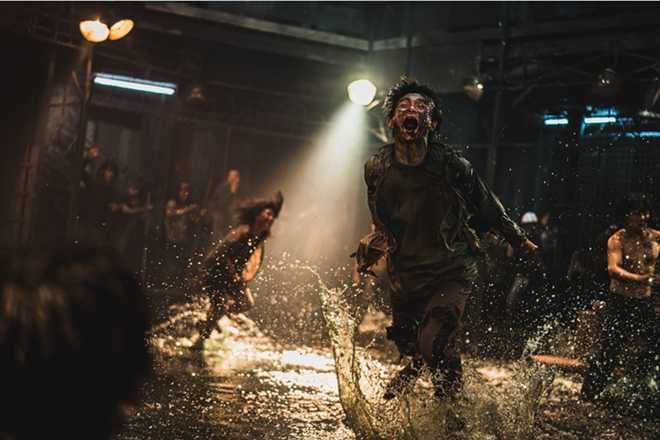
Sometimes, less is more.
When “Train to Busan” debuted in 2016, South Korean director and co-writer Sang-ho Yeon stunned the horror community with arguably one of the best, most visceral zombie thrillers ever made.
Set almost entirely on a bullet train speeding from Seoul to Busan, with a father and his child trying to survive as more and more train cars become infected by a virus and turn into teeming petri dishes of frothing, flesh-hungry monsters, Yeon displayed a mastery of concise, effective story-telling and a penchant for gory, undeniably intense set pieces.
Train to Busan Presents: Peninsula
3 out of 5 stars
Run Time: 116 minutes
Now Playing
Jump forward four years, Yeon’s inevitable sequel, “Train to Busan Presents: Peninsula,” which he also co-wrote, has arrived ironically at the peak of a global pandemic.
“Peninsula” is bigger, brasher and much more ambitious in its scope, but at a cost.
By exploring the decimated outside world only glimpsed in “Train to Busan,” Yeon exponentially expands his playground to the entire city of Incheon, which allows for thousands more infected to constantly threaten his heroes. What his sequel lacks, though, is originality.
What’s most fascinating about “Peninsula” isn’t that it suffers from the same sense of familiarity that almost always accompanies bigger budget sequels.
What stands out about “Peninsula” is how Yeon essentially stages his two-hour mashup as an homage to three well-known U.S. blockbusters.
The first half-hour or so is all “World War Z,” and serves as its own prequel, as Jung Seok (Dong-Won Gang), his sister, her son and husband, Chul-min (Kim Do-yoon), flee the pandemic shown in “Train to Busan” by getting on a military vessel bound for Hong Kong. Along the way to the port, Jung Seok refuses to stop and help a mother and her two daughters. Once on the ship, an outbreak occurs, allowing Yeon the opportunity to use the cramped confines to his advantage, just as he did with “Train to Busan.”
“Peninsula” then jumps four years into the future.
Jung Seok and Chul-min are now in Hong Kong, where the few survivors of the military ship outbreak were allowed to remain as refugees. They are recruited by a crime boss to stage an attempted heist of millions of dollars abandoned in an armored car at the heart of Incheon, which has been overrun with infected as well as fortified encampments of survivors who now make their own laws.
At this point, “Peninsula” essentially becomes “Escape from New York.”
Yeon does a great job with his camera, capturing some gorgeous panoramic shots of Incheon as the team arrives by raft under cloak of darkness, using military-grade goggles to detect the infected always lurking nearby. The heist is impressively staged, but of course it fails, allowing Yeon to separate his two protagonists, who have about a day to get back to the extraction point, or risk being stuck in Incheon forever.
Chul-min is captured by members of Unit 631, a lawless camp established by soldiers sent to Incheon to help four years earlier. Their expansive HQ is like an abandoned shopping plaza or cultural center with a huge open pavilion where Captain Seo (Gyo-hwan Koo) and Sergeant Hwang (Min-Jae Kim) provide entertainment by pitting dozens of survivors against a handful of infected in a Thunderdome-style skirmish for survival.
Jung Seok, meanwhile, is rescued by the two girls and their mother, Min Jung (Jung-hyun Lee), whom he refused to help years earlier.
Yeon does an incredible job showcasing his ability to craft thrilling action sequences by having one of the girls do most of the driving, drifting and smashing an SUV into scores of infected with glee.
By the time “Peninsula” kicks into its third act, Yeon triples down, channeling “Mad Max: Fury Road,” and creating a nearly 45-minute chase through Incheon packed with explosive stunts, ridiculous crashes and a never-ending stream of infected.
All of which works, mostly. “Peninsula” is solidly entertaining, if a little exhausting.
Again, it's just not very original.
As a viewer, when you’re too aware that what you’re watching is not really new, that can be a problem. But it becomes a much bigger deal because Yeon fails to match his most impressive sequences from “Train to Busan” with anything half as fresh or thrilling in “Peninsula.”
For local fans who don’t feel quite safe enough venturing out to see “Peninsula” at AMC Veterans 24, there is good news. Yeon’s sequel will debut on Shudder’s streaming horror platform in early 2021.
John W. Allman has spent more than 25 years as a professional journalist and writer, but he’s loved movies his entire life. Good movies, awful movies, movies that are so gloriously bad you can’t help but champion them. Since 2009, he has cultivated a review column and now a website dedicated to the genre films that often get overlooked and interviews with cult cinema favorites like George A. Romero, Bruce Campbell and Dee Wallace. Contact him at Blood Violence and Babes.com, on Facebook @BloodViolenceBabes or on Twitter @BVB_reviews.

